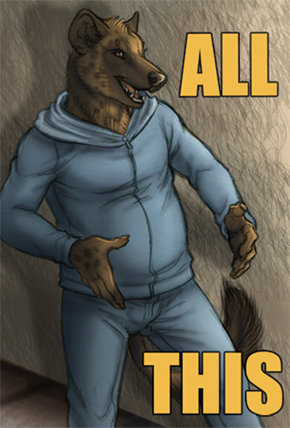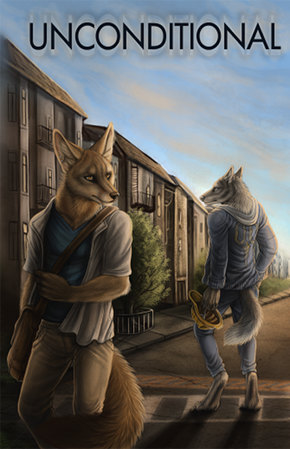Interview: Rukis reflects on 'Unconditional'
To celebrate the recent premiere of Red Lantern: Conviction, Isiah sat down with Rukis to discuss her latest publication, Unconditional.
Isiah Jacobs: Hello again, Rukis! It's so nice to have you on the show again! It's been too long!
Rukis: That it has. Wait . . . it's been like a few months. Really not that long, honestly.
Isiah Jacobs: Much too long, in my opinion! I'm sorry you couldn't make it for the interview with Kyell Gold about Green Fairy. However, by that time, you were busy wrapping up Unconditional and preparing for AC, so I don't blame you. You had originally started working on this back in January or so, right?
Rukis: That was the plan. Progress was slow for a while, though, for purely financial reasons. It's tough to work on a free-to-read comic and pay the bills. The income I see from comics generally comes after they've been printed. So it's always a balancing act, making time for them.
Isiah Jacobs: Were you a little upset to work on your own again after working with Alector for so long?
Rukis: Not at all. I enjoy working at my own pace, honestly. I've only got myself to answer to. And I also really want to improve my background work before I work on Conviction, and this was a good opportunity.
Isiah Jacobs: At the end of Cruelty you had intentionally left it open for a sequel based on audience reaction, right?
Rukis: I had. I actually had a lot of the characters' futures sort of planned out; Reis's eventual career, most importantly. That's why I was so VERY specific with Marcus's dialogue in Cruelty about his charges being dropped down to an infraction.
Isiah Jacobs: Because you like seeing him in a police uniform?
Rukis: Well . . . yes. I have a few police officers in my family, and it's a career I'd always imagined right for Reis.
Isiah Jacobs: Aside from the eye candy, why is that?
Rukis: Well for one, Reis's background. A lot of police officers and law enforcement get into their line of work because they experienced something traumatic or upsetting in their childhood or younger years, and the desire to help others suffering the same afflictions becomes a driving force in their life.
In addition, Reis is a very physically intimidating man, with a strong bearing, who in actuality is not fond of violence, and is extremely empathetic. He's got a strong constitution, but a soft heart. He could do what's necessary for a law enforcement professional, while not abusing the position.
Isiah Jacobs: He did seem pretty adamant about staying away from opiates.
Rukis: Well, he also had a concussion in that scene. :-P
Isiah Jacobs: Which reminds me, you sure do like including opiates as a vice into your stories, don't you? :-P
Rukis: I do. I have my reasons. Opiates have not directly impacted my life in any way, but substance abuse has, and I knew I wanted to write stories that involved substance abuse of some sort. You never write exactly about what you know, or it hits too close to home.
Isiah Jacobs: But you want to include enough so that you become emotionally invested in your story, and therefore the readers?
Rukis: I get emotionally invested in a lot of aspects of my stories. You've really got to, or why else would anyone else read it? I try to focus on mundane, everyday issues, even if they are in a fantasy setting. Things I can learn about either from my life or from people I know. It helps write them more realistically.
Isiah Jacobs: Since you left it open for a sequel, why did you decide on the path the story takes? Why two years later? Why not pick up right where Cruelty left off?
Rukis: Because there really wasn't a story there. Reis detoxes, and they move to Fontaine. The detox might be worth a short story, but that's it.
Isiah Jacobs: You didn't want to elaborate on their relationship in high school?
Rukis: The story came at the turning point in their lives, when Marcus was embarking on his career, and Reis had begun to realize how little his future held for him. Cruelty ended with High School ending, for the most part. There were a few weeks left, and Reis had dropped out. So there wasn't much more to tell. There was more to their lives beforehand, which I do plan to elaborate on, in short stories.
Isiah Jacobs: Reading this comic, I couldn't help but notice quite a bit of symbolism. Especially with the cover. How it's a metaphor for how Reis and Marcus both approach life in general. Did you know you wanted to go with this from the very beginning?
Rukis: The road metaphor? Absolutely. The cover represents their relationship, and it's always meant to. Notice Reis is standing on the crosswalk.
Isiah Jacobs: What was your inspiration for this metaphor?
Rukis: Actually, you're going to laugh, but my younger brother. When we were kids, he used to cross the road to get to school without looking both ways. He almost got hit by a car once, and we both got in a ton of trouble. I think you can judge a lot about a person by how they choose to go about their daily lives in really small things, like that. Reckless, dreamy people just . . . tend to not look both ways. :-P
Isiah Jacobs: So do you think that Marcus behaves like a child in the first part of the story?
Rukis: I wouldn't say a child, no. He behaves like an adult who doesn't entirely have both feet on the ground. And I know a lot of adults like that. Being that bold, and having that 'all in' attitude with your life is what leads people to do some pretty spectacular things, though. Marcus is always going to be very fiery, very outspoken, and very passionate.
Isiah Jacobs: Spectacular things; like creating a web comic?
Rukis: Comicking is actually a really dull, repetitive process :-P But I do find myself having moments where I'm Marcus. I also find myself having moments where I'm Reis.
Isiah Jacobs: And moments where you're like, "ALL THIS!"?
Rukis:I love Lou so much. I really wanted a lovable, loud straight guy to show Marcus the whole straight world isn't out to get him. Lou really fit the bill.

Isiah Jacobs: Is Lou based off straight people you've personally met?
Rukis: He is almost entirely based off of my mate, Chris. Right down to build . . . which was convenient. I just had him pose for me whenever I was drawing him.
Isiah Jacobs: And one day he got a look at it and started quoting it all the time?
Rukis: Yeah, pretty much. He, Cassie and I. We were all doing it.
Isiah Jacobs: I'm surprised it hasn't caught on at this point!
Rukis: It has, actually.
Isiah Jacobs: Really?
Rukis: A bunch of people kept doing it to me at Anthrocon.
Isiah Jacobs: Did you get any photos or videos?
Rukis: lol, no sorry.
Isiah Jacobs: Awwww... To go back to my earlier statement; another metaphor I noticed was the warehouse that Reis works at and Marc's comment towards it at one point. "Grey and oppressive."
Rukis: Well, it is. Ever worked at a warehouse? It sucks.
Isiah Jacobs : I couldn't help but think of it as a symbol of society and bigotry from straight people towards gays. And really a symbol of what gays perceive the straight society to be in general.
Rukis: That actually wasn't where I was going with that, but sure :-P
Isiah Jacobs: What was your intention?
Rukis: I've actually just worked a lot of labor jobs, done store setup and warehouse work, and that's always how it felt to me.
Isiah Jacobs: Okay, I gotcha. It's just that it sort of made me think all the pride flags out there, like the gay flag, the bi flag, the transsexual flag, etc. And how the straight flag is black and white. Just a random connection I made.

Rukis: Well hey, I'm all for folks making connections I didn't even count on.
Isiah Jacobs: Another thing that caught my interest was after the first sex scene between Reis and Marc, he has this sort of inner monologue about how he loves Marc, but he can't really love himself. Could you elaborate a bit more on this theme?
Rukis: It's pretty self-explanatory, honestly. Reis has a lot of self-worth problems. He talks about it later on in the book, too. It's ultimately why he got into drugs, aside from the drug use in the family. The inability to love oneself is a problem a lot of people struggle with. The most effective cure for it, I find, is to feel productive in your life. To do something with yourself that you can be proud of. In Reis's case, he finds this when he has an opportunity to train to be a police officer, and start down the path to a real career.
Isiah Jacobs: And that's why he's so adamant about wanting to work as much as possible so that he feels like he's still helping?
Rukis: He just wants to work, period. I've been in his position before, which is why it was so easy for me to write about this. Hopping minimum wage jobs with no real future is no way to make a living. He doesn't feel fulfilled. He really wants to DO something meaningful with his life, outside this relationship he has with Marcus.
Defining your whole life by a relationship isn't healthy, and that's what he's trying to avoid. I chose a distribution center because it's a job I know a little bit about, and because Reis is, like I said before, a large guy. A physical job suited him. Warehouse work is really hard on the body. It's the sort of starting job that has a lot of turnaround, and a lot of places insist you be able to lift a certain weight to even fill the position. It seemed to me like a job Reis would fall into.
Isiah Jacobs: Obviously, one of the most tragic moments in this comic is the death of Reis' mother. I know that it sort of adds to his feelings of self-worth and it leads in to him going into law enforcement, but what was the biggest purpose for her death?
Rukis: Reis's mother's death was all but inevitable. She's a very self-destructive woman, and she had a lot of problems.
Isiah Jacobs: You didn't see any redemption for her?
Rukis: Unfortunately, her death in the story IS her redemption. Gloria wasn't ultimately able to give her son anything while she was alive. But losing her really spurs him on to avoid his family's mistakes, and make something of himself. There isn't always a happy ending for every character. Death isn't a happy thing, but it's a part of life.
Isiah Jacobs: Going further with this train of thought, you've also stated in the past that traumatic scenes are your favorite to draw. Why is that?
Rukis: It's the emotion, I think emotions are never so raw as they are when a character is suffering.
Isiah Jacobs: What about laughter? That's also a very natural, raw emotion.
Rukis: I try to throw in a bit of humor here and there. There certainly seemed to be a few scenes that amused people!
Isiah Jacobs: Well there needs to be more of it! Your stories are all so tragic!
Rukis: Heh, maybe a little.
Isiah Jacobs: A little?! Be honest, Rukis!
Rukis: Pfffft. Unconditional was HAPPY.
Isiah Jacobs: Just saying!
Rukis: You just wait. Red Lantern is SO much worse.
Isiah Jacobs: Unconditional had a happy ending, yes! But GOD DAMN was it an emotional roller coaster to get there!
Rukis: Perhaps, but then, that was the point!
Isiah Jacobs: You wanted people to get emotionally whiplashed?
Rukis: Maaayyyybe. Like I've said before, I like stories that make you feel. There were a lot of happy, romantic moments in Unconditional, too. Especially the ending. ;-)
Isiah Jacobs: The most outstanding quality for Unconditional is how controversial it gets.
Rukis: Yeah, I really enjoyed watching people debate online.
Isiah Jacobs: Now, I know you said that the views expressed are not your own and that some of it is heavily based from real life. There are just a few things I would like to be made clear. The Bauer family is based off the Westburo Baptist Church, right?
Rukis: I don't really want to say that on the record.
Isiah Jacobs: That's fine!
Rukis: Suffice to say, it was highly inspired by a real-world group.
Isiah Jacobs: As well as their protest of the death of a gay soldier?
Rukis: Perhaps.
Isiah Jacobs: You mentioned just a bit ago how you like getting your readers to feel something particular in regards to your story. Is this the perfect example of that?
Rukis: I don't really want them to feel something in particular. You can't control how people react to a story. It's watching all those different reactions that's so awesome.
Isiah Jacobs: The pages for those particular scenes got hundreds of comments. Did you read them all?
Rukis: For the most part, yeah, I tried to. I gave up trying to respond to a lot of the questions directed my way, though . . . there were just too many, but I did the best I could.
Isiah Jacobs: What do you remember feeling in regards to all of the heated debating going on?
Rukis: I was honestly really happy. Most of it was pretty intelligent discussion. It's really cool to see something I wrote getting people talking about issues that are important to them.
Isiah Jacobs: "Most" being the key word there. And I believe that it was intentional on your part that both sides don't come across as entirely right in their argument. Why did you do this?
Rukis: Because there's always two sides to any argument. And I didn't want to paint either side as entirely in the wrong. Even people with the best intentions sometimes go about them in the worst ways.
Isiah Jacobs: Do you think that people get too wrapped up in emotions leading to poor decisions?
Rukis: Of course. Not that being emotional is a bad thing. Having strong emotions has lead people to commit some very bad acts, and some really wonderful ones.
Isiah Jacobs: One very interesting thing I noticed is that the Bauer family isn't part of a specific religion. What made you decide this?
Rukis: This is a different world. The religions in the Cruelty/Unconditional world wouldn't be religions from our world. Besides, Bauer's group were extremists . . . even if they had been part of a real-world religion, they would still be outside the norm.
Isiah Jacobs: During this scene, at one point, the son of Pastor Bauer throws a rock at one of the protesters. I found it very interesting that a lot of the gay readers instantly jumped to the conclusion that it was a hate crime and that the boy was taking his first steps toward extreme homophobia.
Rukis: Children are very influenced by the attitudes and actions of the adults around them. And both sides of this dispute were being loud, and angry.
Isiah Jacobs: However, your original intention was because he's young and naive and doesn't understand why this group of people randomly starts coming up to harass his dad, correct?
Rukis: From a child's perspective, anyone being angry and yelling at their parents is very, very frightening. A child isn't necessarily going to understand the deeper implications of a scene like that . . . they just know that someone is threatening their family.
Isiah Jacobs: Thank you, Rukis. On a lighter note, Marc's choice of clothes in this scene. Did you intentionally want to make him look so feminine?
Rukis: He normally wears much more masculine clothes, actually, but at the protest, he dressed to provoke. So he dressed more 'out' than he usually does.
Isiah Jacobs: Hence the tapered, womanly vest?
Rukis: Yep.
Isiah Jacobs: Do you think that provocation like that can get too far sometimes?
Rukis: It happens all the time, and unfortunately, a lot of people like Marcus get hurt. Which is pretty much precisely what Reis was worried about.
Isiah Jacobs: This is another very interesting thing I noticed. To be blunt, Marcus seems to have his head so far up his ass, he doesn't even recall the beginning of Cruelty!
Rukis: Marcus is a very different person than he was in High School.
Isiah Jacobs: It's like both Marc's and Reis's personalities were given steroids! It's all so intense!
Rukis: What you have to realize is that in high school, Marcus was a gay teen in a tiny midwest town, with very few friends who weren't female, and almost no support network for his sexuality. He spent most of his time in high school afraid to be who he was, but looking to and planning for the future.
In Unconditional, he's an Ivy-League student, he leads a group of activists in the LGBT community, he's found a lot of other people like him, and he's about to enter the real world. He's on top of the world, and rearing to make changes. And this is where all his bravado has come from. Unfortunately, one of the side effects of being successful, and surrounding yourself with like-minded people, is that you can forget the realities of the world. Reis is far more grounded, because he's deal with hard realities his whole life, and his past is very painful, and very hard to forget.
Isiah Jacobs: Another really good topic brought up is when Marcus challenges Reis about being out at work. And that page got A TON of comments! 615 FUCKING COMMENTS, RUKIS! GOD DAMN. Are you proud of yourself?
Rukis: Sort of, I guess? That's really all on you guys.
Isiah Jacobs: Again, there was even more heated discussion about being out at work. Were you surprised at how much of a shit storm you were able to stir up with this comic?
Rukis: Not really. People feel able to talk about things they feel strongly about a lot more freely online, I've noticed.
Isiah Jacobs: Because of the anonymity. So, if you do plan on doing another sequel, do you think you'll do another jump forward in time?
Rukis: I won't be doing another, I'm afraid. This was the end of the series. I'm going to do some short stories and whatnot, but there just isn't another whole story with these characters.
Isiah Jacobs: You do realize how disappointed people are going to be because of the ending, right?
Rukis: Disappointed? Well, I'd hope not. The ending of Unconditional is fairly final. There's a lot more that will happen in their lives, yes . . . but the most pivotal parts of their lives were covered by the two comics.
Isiah Jacobs: You have to admit, Marcus and Reis have a pretty big, dedicated fan base! Oh! I just remembered! You also mentioned in the past how Marcus is capable of doing a 180 in terms of emotion.
Rukis: He's very up and down, yeah.
Isiah Jacobs: Like, he can go from fuming mad to flaming gay in WTF seconds. Don't you think that's a bit bi-polar?
Rukis: Okay, one thing you have to understand about Marcus . . . A lot of what he does is for shock value, or to give off the right impression to others. Marcus is not actually obnoxiously gay . . . most of the time when he acts that way, he's trying to get on people's nerves. Usually Reis's. :-P
Isiah Jacobs: So he enjoys annoying people?
Rukis: Marcus likes to provoke. It's what he does. And no, he's not bipolar :-P He's just . . . dynamic.
Isiah Jacobs: Well then I take that bi-polar comment back. He sounds more like a sociopath.
Rukis: lol, no!
Isiah Jacobs: Okay then, a troll! An internet troll!
Rukis: Sociopaths have no empathy . . . Marcus does have empathy . . . he just gets really wrapped up in his own thing sometimes, and loses track of the people around him. He tends towards selfish, a lot of the time.
Isiah Jacobs: As I understand it, Sidian is working on a side comic where it goes more in depth about one of Marc's activist friends, Jacob. Are you working with her on this?
Rukis: Somewhat I read her script and gave some suggestions, and I'm collabing with her on the cover. That's about it, though.
Isiah Jacobs: So she's coming up with the reason why Jacob dislikes hospitals and doctors?
Rukis: No, we had that planned out ahead of time. We were working on developing Jacob before I even started Unconditional.
Isiah Jacobs: And why is that?
Rukis: Well, Jacob was always a character meant to appear in the comic, but Sidian really wanted to do a comic, with a fox main character. And I recommended she make a comic in the same world. I figured the readers would really appreciate it.
Isiah Jacobs: What was so important about Jacob that he was planned from the beginning?
Rukis: There needed to be a 'home wrecker' character to cast doubt on the relationship somewhat, even if that wasn't what he was ultimately trying to do.
Isiah Jacobs: Well, I believe I've kept you long enough. Thank you so much for joining me again! I look forward to having you back for the print release of Conviction. Which will most likely be next year, right?
Rukis: Probably right around the beginning of 2014.
Isiah Jacobs: D: Why so long?!
Rukis: They take about a year and a half to make, and Conviction is much longer than volume 1, or at least, that's what the script is looking like.
Isiah Jacobs: :O Wow! Well, until next time! I'm sure you're going to miss ALL THIS! ;D
Rukis: Nah, I've got it here at home.
Unconditional is available now at FurPlanet.com

About the author
Isiah Jacobs — read stories — contact (login required)a furry journalist and Spider from Michigan, interested in science fiction

Comments
Post new comment